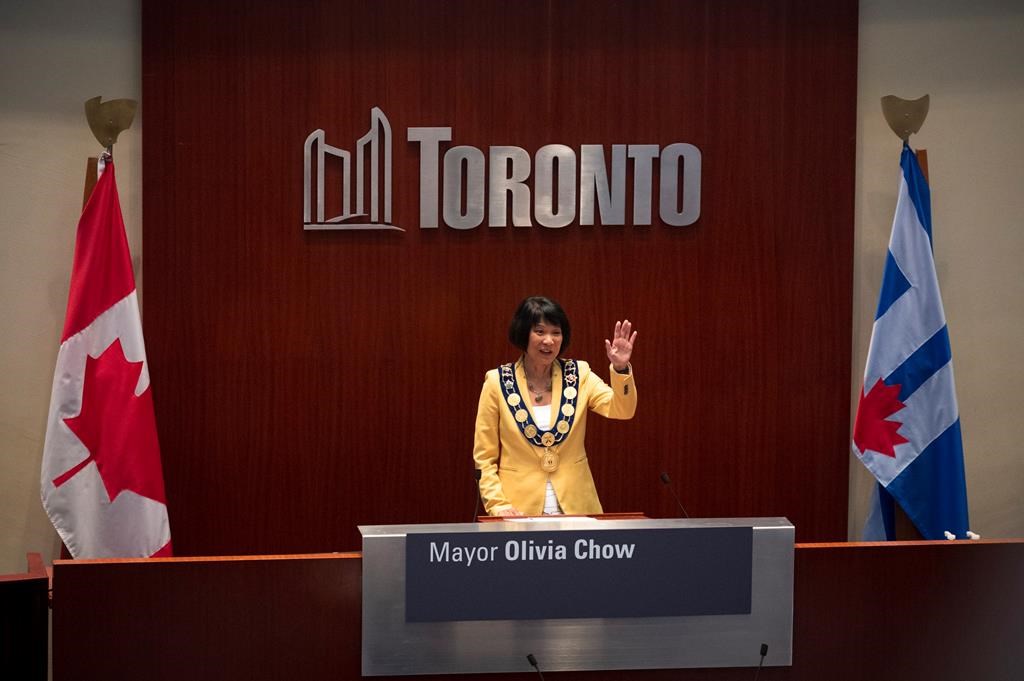TORONTO — Olivia Chow encouraged residents to envision a more compassionate and affordable Toronto on Wednesday as she officially took office as mayor in a city facing major housing and financial challenges.
The 66-year-old former NDP MP and past councillor – the first person of colour to lead Canada’s most populous city – drew on themes familiar to her election campaign as she made her first speech as mayor, casting Toronto as a resilient city primed for change.
“Let’s build a Toronto that is more affordable, safe and caring, where everyone belongs,” Chow said to cheers and applause in a packed council chamber.
“Together we can and today, we start.”
Her remarks made overtures to the shortage of affordable housing and a transit system burdened by service cuts, while taking a jab at what she called the city’s “reluctant partners” in the provincial and federal governments for withholding a bailout of Toronto’s pandemic-ravaged finances.
This year’s city budget is short nearly $1 billion, largely driven by increased shelter costs and decreased transit revenues.
“We need a new deal for our city,” Chow said. “Toronto needs strong federal and provincial partners who recognize our city’s crucial role in the economic and social life of our province.”
Chow’s ascension to the city’s top job is a high mark in an enduring political career. She was first elected as a school board trustee in 1985, sat for 13 years on Toronto city council until 2005, and then went to Ottawa as an NDP MP alongside her late husband, former federal New Democrat leader Jack Layton.
She immigrated to Toronto from Hong Kong at 13 years old, settling with her parents in a high-rise apartment in St. James Town, a familiar landing in the downtown core for many working-class newcomers.
“Toronto’s story is also my story,” she said, as she asked those gathered to imagine a young family arriving in the city today with dreams for a better future.
“We all know what they’re up against. So, let’s imagine what could be possible when we meet our challenges with the boundless potential of our ideas and the strength of our collective action.”
Chow defeated 101 other candidates to win last month’s mayoral byelection to replace John Tory, who resigned after admitting to an affair with a staffer. It marked a reversal of her electoral fortunes after finishing third in the 2014 election.
“Toronto’s story has never been about giving up,” she said.
Her declaration of office ceremony, emceed by actor Jean Yoon, featured a reading from the city’s poet laureate and remarks from Indigenous elders. An acapella group led by Lorraine Segato, the frontwoman for Toronto band The Parachute Club, got the chamber to their feet with a rendition of the group’s 1983 hit “Rise Up.”
Chow’s family looked on from the front row as she was introduced with a standing ovation.
“There’s no one I can think of that would do a better job,” said Mike Layton, her stepson and a former city councillor. “To see her back here serving in that capacity, I know it’s something that she feels is great privilege.”
Since the June 26 byelection, Chow has been meeting with city administration, finalizing her team and holding transition engagements with civil service and non-profits on priority issues.
Chow has pledged to get local government back into the business of building social housing and to spend millions to acquire and preserve affordable units.
“We can and must start by tackling the housing crisis,” she said. “The suffering is real.”
Chow’s mayoral term runs until 2026 but will be quickly tested by the city’s turbulent finances.
A city staff report indicates there are enough COVID-19 reserve funds set aside to prop up this year’s budget, but without more money the backstop would be insufficient to cover next year’s projected shortfall of up to $927 million.
Another pressing issue is the city’s housing crisis and the record levels of people experiencing homelessness.
Adding to a sense of urgency, the city has been deadlocked with the federal government over a request to provide more money to help house asylum seekers, with the city recently instituting a policy of turning away those applicants from at-capacity shelters towards federal programs.
Chow would not commit to overturning the controversial policy on Wednesday, even as critics argue it violates the city’s own standards against turning people away based on immigration status. She pressed Ottawa for an additional $160 million to help shelter refugees, calling it a federal responsibility.
A number of issues could test the relationship between Chow and Premier Doug Ford, including the province’s plan to add a privately owned spa to a redesigned Ontario Place. Chow has suggested the city would go to court if the province tried to expropriate city land for the project.
Ford said Wednesday he was “disappointed” by Chow calling the province a reluctant partner.
During the byelection campaign, Ford backed ex-police chief Mark Saunders and said a Chow mayoralty would be an “unmitigated disaster.” He softened his language after her win, highlighting a number of files for potential collaboration, such as transit expansion and housing affordability.
“So that’s what we’re going to be focusing on and hopefully she’ll be open-minded and work collaboratively with us,” he said during a news conference at a meeting of provincial and territorial leaders in Winnipeg.
This report by The Canadian Press was first published July 12, 2023.



